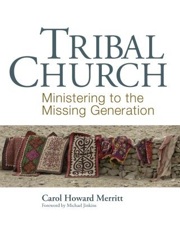
I first ran across Carol Howard Merritt last fall. Her husband (pastor and blogger Brian Merritt) informed me about her blog, Tribal Church, and her book, also called Tribal Church. Carol is graduate of Austin Theological Seminary and is currently a Presbyterian pastor at Western Presbyterian Church in Washington, D.C and a friend of presbymergent. The subtitle to her book is “Ministering to the Missing Generation” and in it, she talks about one of the demographics that is probably the least-reached in Mainline Protestantism: 20-30 somethings or “emerging adults.”
In her book, Carol argues that there is a new younger generation that is looking for spiritual community, and she says many of them are looking for small to medium-sized, traditional churches. She argues that it is the mainline church that can offer spiritual community to this group. In many ways, Carol is doing similar work as Diana Butler Bass, in that I saw many similarities between Tribal Church and Diana Butler Bass’s “Christianity for the Rest of Us.” One of the biggest similarities was a strong hope in the mainline church amidst all of the talk of the death of the mainline.
I don’t interpret Carol’s hope in the mainline as a blind, ignorant hope, a hope that says, “Oh – we have tons of money, and a great pension fund, so stop worrying…” Rather, she is rather pragmatic and knows that some things will have to change if the mainline is going to be able to make an impact on this generation. She focuses on six primary ways in which the mainline church is prepared for, and can make changes to work toward meeting the needs of the “missing generation.” The six ways are through intergenerational relationships, economic understanding, unambiguous inclusion, affirming traditions, shared leadership and spiritual guidance. I think she’s right in identifying these six characteristics, and I think they are very important to the future of the church. In light of my recent post on pluralism, I found this quote especially insightful:
“As young Christians approach religion, we know that Christianity is true; yet, we also have the humble sense that our infinite God could never be contained in our limited creeds or our most voluminous theological libraries. We sense that God reveals Godself through other cultures and other systems of thought…Throughout these discussions [interfaith dialogue], we realize that we may have one brilliant perspective on God, but divine character is much more varied than we can imagine, and so while we may have a glimpse of who God is, we know we cannot behold the face of God, and we can humbly admit that others may have a worthy perspective that broadens our own” (66-67).
As I’m in the process of searching for my first call right now, I can tell you that the six characteristics Carol mentions are ones in which I am hoping to find in a church as well. If you’re interested in ministry to youth or young adults, I would highly recommend Carol Howard Merritt’s book Tribal Church.